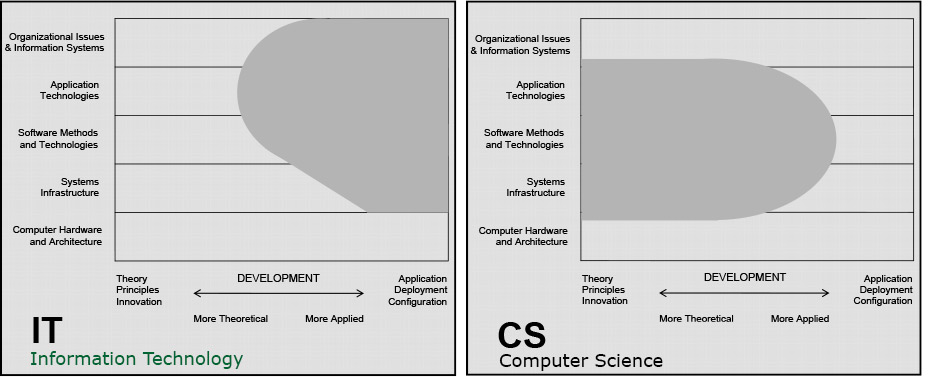Frequently Asked Questions
IT : Compared to Other Computing Disciplines
The academic discipline of IT is recognized by ACM (Association for Computing Machines) as well as IEEE (Institute of Electrical and Electronics Engineers)as a peer in the menu of computing disciplines along side computer science (CS), information systems (IS), and computer engineering (CE). The below diagrams illustrate how IT compares to CS and IS, the other two most closely-related computing disciplines.
 |
 |
| Levels in Computing | Job Description | Expected Qualification |
|---|---|---|
| Application Level (High Level) | Design & Development of Total Business Solutions. eg:
|
Information Technology |
| System Software Level (Low Level) | Design & Development of System Software (eg. Operating Systems, Compilers etc) | Computer Science |
| Chip Level | Design & Development of Computer Circuits | Electronics/VLSI |
Broad goals of an IT program
Experts say IT deals with the business side of Computer Science. It focuses on satisfying the computing technology needs of organisations. Computer Science, on the other hand, lays emphasis on foundation on computing.
- Computer science deals with creating computer programs while IT deals with the usage of those programs in business.
- Information technology integrates computer science into the business world for automated solutions.
- Computer science is at the 'lower level' while Information technology is at high level, in computing terms.
- Computer scientists should have low level workings of computers whereas in IT, it is depends on customer and business requirements
JOB TITLE |
JOB SUMMARY |
Computer and Information Research Scientists |
Computer and information research scientists invent and design new approaches to computing technology and find innovative uses for existing technology. They study and solve complex problems in computing for business, medicine, science, and other fields. |
Computer Network Architects |
Computer network architects design and build data communication networks, including local area networks (LANs), wide area networks (WANs), and intranets. These networks range from a small connection between two offices to a multinational series of globally distributed communications systems. |
Computer Programmers |
Computer programmers write code to create software programs. They turn the program designs created by software developers and engineers into instructions that a computer can follow. |
Computer Support Specialists |
Computer support specialists provide help and advice to people and organizations using computer software or equipment. Some, called computer network support specialists, support information technology (IT) employees within their organization. Others, called computer user support specialists, assist non-IT users who are having computer problems. |
Computer Systems Analysts |
Computer systems analysts study an organization’s current computer systems and procedures and design information systems solutions to help the organization operate more efficiently and effectively. They bring business and information technology (IT) together by understanding the needs and limitations of both. |
Database Administrators |
Database administrators (DBAs) use specialized software to store and organize data, such as financial information and customer shipping records. They make sure that data are available to users and are secure from unauthorized access. |
Information Security Analysts |
Information security analysts plan and carry out security measures to protect an organization's computer networks and systems. Their responsibilities are continually expanding as the number of cyberattacks increase. |
Network and Computer Systems Administrators |
Computer networks are critical parts of almost every organization. Network and computer systems administrators are responsible for the day-to-day operation of these networks. |
Software Developers |
Software developers are the creative minds behind computer programs. Some develop the applications that allow people to do specific tasks on a computer or other device. Others develop the underlying systems that run the devices or control networks. |
Web Developers |
Web developers design and create websites. They are responsible for the look of the site. They are also responsible for the site’s technical aspects, such as performance and capacity, which are measures of a website’s speed and how much traffic the site can handle. They also may create content for the site. |
Geographical information systems officer |
GIS systems are employed by most sectors of government and commerce and a geographical information systems officer may work for a wide range of employers. Roles can vary but all GIS officers are involved in the production of maps and the analysis of data. They use this to help plan, protect and deliver services or products in areas such as defence, construction, oil, gas, water, telecoms, electricity, the environment, healthcare, transport planning and operation, retail location planning and logistics, insurance and finance. |
Software Architect |
Software architect is a computer manager or expert who makes high-level design choices and dictates technical standards, including software coding standards, tools, and platforms. |
Higher Studies Opportunities
Read Article published on Hindu (Click Here)
Opportunities in Govt. Sector
Read GO Published by Govt. of Kerala (Click Here)
